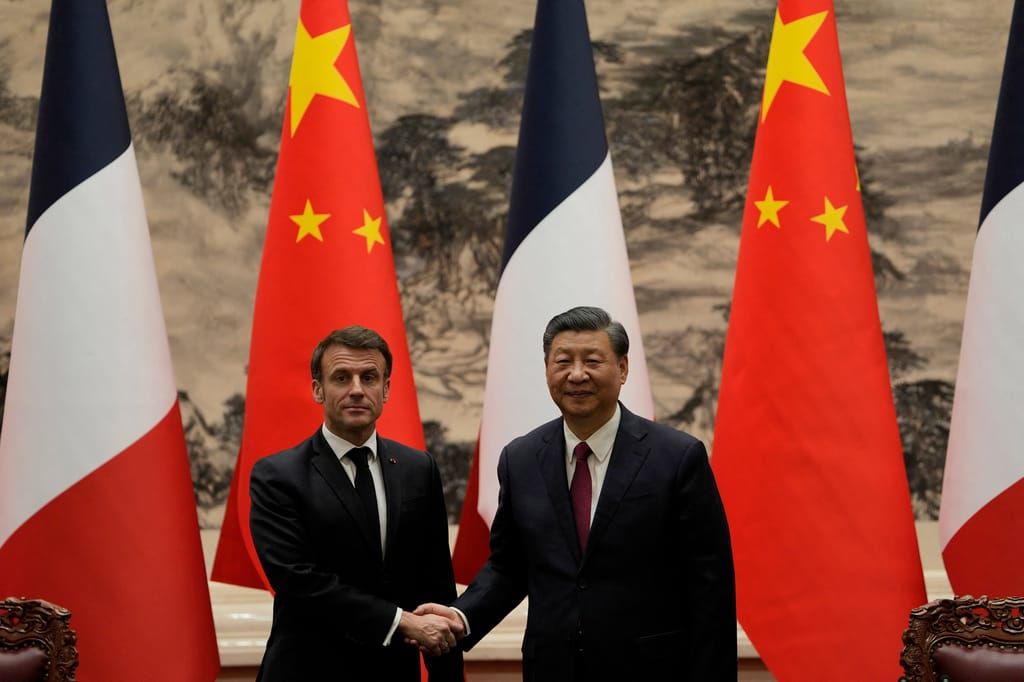
Xi is fixated on ending China’s century of humiliation
In the last few months, five different European leaders have traipsed to Beijing, trying to convince Chinese President Xi Jinping to see the world their way. But except for some contracts benefiting their firms, each has returned to Europe empty-handed.
French President Emmanuel Macron and European Commission President Ursula von der Leyen were the latest to make the journey last week. Their goal was to convince Xi to help broker an end to the war in Ukraine or, as Macron put it, to “bring Russia to its senses.”
The Chinese president demurred.
Blaming NATO for the “crisis,” Xi was angry and annoyed when his European interlocutors brought up the war in Ukraine, saying he would talk to Ukrainian President Volodymyr Zelenskyy only when the “conditions and time was right.” And given that Moscow only recently reiterated that the conditions for peace weren’t yet right, that could be a while.
Europe’s failure to drive a wedge between China and Russia is hardly surprising, though. For Xi, the future is crystal clear: America is in decline, and within a quarter century, China will take its rightful place as the most powerful nation on earth. It can accelerate this future by aligning with Russia and securing its resources — from fossil fuels at cheap prices to the precious critical materials Moscow controls. And it can also accelerate America’s decline by splitting away its European allies.
Under Xi, China has made alignment with Russia a key pillar of its policy for years. Since taking power over a decade ago, Xi and Russian President Vladimir Putin have met 44 times and spoken untold hours about common concerns. Their militaries have exercised together countless times, even simulating nuclear bombing runs.
Just last month, Xi assured Putin: “Right now, there are changes, the likes of which we have not seen for 100 years. And we are the ones driving these changes together.”
Similarly, it isn’t surprising that Beijing has embraced the idea of Europe’s “strategic autonomy” and launched a charm offensive — including inviting five of the Continent’s top leaders for extensive talks with Xi since last November. The goal is to lift Europe up, while pushing the U.S. down.
So, while Xi blames the U.S. for the “all-around containment, encirclement and suppression of China,” his new ambassador in Brussels calls China and the European Union the “two major forces upholding world peace, two big markets promoting shared development, and two great civilizations promoting human progress.”
And this approach seems to be working — at least when it comes to Macron. As POLITICO reported, on his way back from six hours of talks with Xi, the French president mentioned the wonders of multipolarity, Europe becoming the “third superpower” and its need to avoid being America’s “followers” or “vassals.” When it comes to Taiwan, Macron declared, “the great risk” Europe faces is that it “gets caught up in crises that are not ours, which prevents it from building its strategic autonomy.”
Music, surely, to Xi’s ears.
 French President Emmanuel Macron shakes hands with Chinese President Xi Jinping during a joint meeting of the press
French President Emmanuel Macron shakes hands with Chinese President Xi Jinping during a joint meeting of the press
But to be fair, Macron and other European leaders who share these views do have a point. The U.S.-China relationship is threatening to spiral out of control, and Europe — or the rest of the world, for that matter — doesn’t want to get caught in the middle.
Xi is fixated on ending China’s century of humiliation by having it emerge as the greatest power on earth, and he fears the U.S. is equally determined to do everything it can to ensure he fails. Meanwhile, in Washington, a town so polarized that opposite political forces rarely talk to each other, China bashing has become a bipartisan occupation, the only question being who can bash the Chinese Communist Party harder.
Top White House officials, including U.S. President Joe Biden himself, are growing concerned that this bipartisan consensus is undermining sound policy and, instead, feeding a dangerous escalation in relations with China that both countries will find increasingly difficult to stop — last February’s spy balloon saga shows just how rapidly things can spin out of control.
And it is here that Europe can help.
Biden understands that the key to U.S. success in competing with China lies in close partnership and alliance with its European, and Asian, friends. When it comes to critical technologies — like quantum computing, advanced robotics, synthetic biology and generative AI — as well as reliance on critical materials and sensitive supply chains, the U.S. and Europe need to work together to compete with China effectively.
Many in Europe get this. Indeed, before setting off for China, von der Leyen delivered a speech on EU-China relations that could have been delivered by Biden himself. Xi’s “clear goal,” she said, “is a systemic change of the international order with China at its center,” and she called for minimizing trade and investment in critical technologies and other areas.
Though many contrast this European idea of “de-risking” trade and investment with the supposed American idea of “decoupling” China from the global economy, it’s important to note that few U.S. officials think such decoupling is possible, or even desirable. Indeed, in recent conversations with top White House officials, they also used the term de-risking to describe the U.S. goal toward China.
Europe’s aim should thus be to affirm Washington’s commitment to de-risking — not to decouple the Chinese economy from their own. The right European policy is not to chart a middle course but to align the U.S. and Europe on a common path, preventing Beijing from overhauling the global order that’s served the transatlantic partners so well for the past 75 years.











